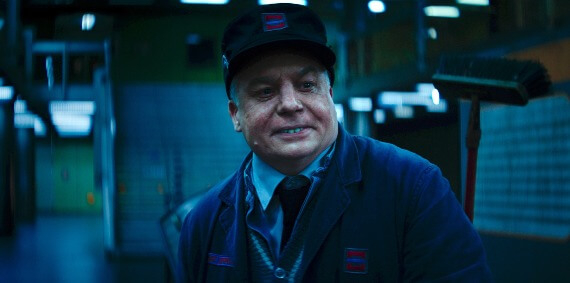
The establishing scenes of writer/director Vaughn Stein’s debut feature film, “Terminal” are stunningly shot but purposely made vague.
We meet Annie, a femme fatale (there’s no better way to describe her character) played by Margot Robbie. Annie receives sinister instructions from an electronically altered voice in a confession booth.
She dwells in a subway terminal that is so stylishly attired, it looks like a comic book world (or an unseen section from a “Dick Tracy” cityscape). Also in the subway are her mark (Simon Pegg, good in a dramatic role), a couple of gangsters (including Max Irons, son of Jeremy Irons) and a whimsical janitor (Mike Myers, good in an odd character role).
As the situation slowly reveals itself, the conversations become more tense and the threat of violence is finally realized. If I’m being unclear about what takes place, it’s because I don’t want to spoil the surprises … which most audience members will see coming in the first couple of minutes.
“Terminal” is grating and mean-spirited, with a screenplay cobbled together from other, much better movies. Stein’s story is full of sordid plot details and ugly touches (like child abuse and torture) but none of it shocks or surprises.
This is a peculiar vehicle for Robbie, who proves here (as she did in “Suicide Squad‘ and “The Legend of Tarzan”) to be the best thing in a bad movie.
Robbie has only been a household name for a few years but already has a reputation as a reliable, gifted actress, even as she teeter-totters between great performances in strong movies (“The Wolf of Wall St” and “I, Tonya”) and appearances in unworthy projects like this.
Playing Annie, Robbie appears to be having fun; she knows all too well how to use her sharp features to frightening effect. Just as she did playing Harley Quinn, Robbie can leer in a way that obscures her beauty and creates a dangerous presence.
If only the role wasn’t such pointless camp and unworthy of her considerable talents.
RELATED: HiT Movie Review: ‘I, Tonya’
Myers once again takes on the kind of quirky character turn that marked so much of Peter Sellers’ career. His role here is oddly similar to Charles Chaplin’s final screen appearance in “A Countess From Hong Kong,” though Myers has far more to do here than Chaplin did in that rare misstep.
While “Terminal” is not an action movie, the feel of a “La Femme Nikita” or “Atomic Blonde” shoot-’em up is there. As a depictions of female empowerment through vengeance on abusive men go, this one is sexist, self defeating and quite absurd.
The film’s great distinction (and the one thing that, along with Robbie’s performance, works best) is the cinematography by Christopher Ross and art direction by Adrien Asztalos, which are truly gorgeous. Each scene is beautifully framed, with a cool neon glow burning through the darkness.
FAST FACT: Margot Robbie took off for a Canadian vacation after thinking she flunked her audition for the Aussie soap opera “Neighbours.” She came right back after being notified she had scored the role of Donna Freedman on the long-running show.
“Terminal’s” overall look reminded me of Luc Besson’s 1985 “Subway,” the Christopher Lambert/Isabelle Adjani New Wave time capsule that, like “Terminal,” is heavy on atmosphere and attitude. The 2003 Nimrod Antal thriller, “Kontroll,” is a far superior example of a modern, subway station-based thriller with unique, twisty plotting, colorful characters and visual flair working together.
When “Terminal” finally gets to the triple-twist ending reveals, we discover how all of the surprises have been telegraphed too clearly early on. That leaves Stein to drudge down into sub-par soap opera plotting and wrap things up with a memorably grotesque sequence.

There are ways to effectively balance abundant style with intentionally seedy, noir-ish plotting, but the achievement of the film’s look far outweighs the shortcomings of the screenplay. Dozens of comic book movies (even some of the lesser ones) have created rooting interest and intricate storytelling that accompany (rather than rely on) the splendid visions.
This is dubious praise, but “Terminal” is easily one of the best looking bad movies since “Frank Miller’s “The Spirit.” That said, I prefer Miller’s film, which dared to unapologetically bring back campiness to comic book movies (with extremely shaky results). Stein’s film, with its great cast and surface level appeal, is strictly a curiosity item that can’t surpass the hollow center within this shiny, round, and empty ornament.
